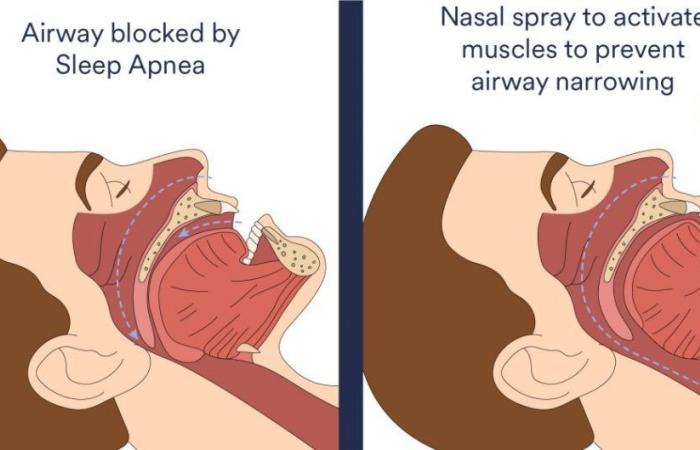03/26/2024
Editorial of the Health Diary
Obstructive apnea not only disrupts sleep, it is associated with a series of serious events.
[Imagem: Flinders University]
Apnea spray
A clinical trial carried out in Australia demonstrated that a nasal spray applied before bed can reduce the severity of sleep apnea and even lower blood pressure.
The aim of the study was to determine the effects of a new potassium channel blocking nasal spray on the severity of sleep apnea, and to investigate the potential influence of different breathing approaches – such as nasal-only restricted breathing – and the physiological characteristics of people who presented with an apnea. favorable response.
“Potassium channel blockers are a class of medications that block potassium channels in the central nervous system. When used as a nasal spray, the blockers have the potential to increase the activity of the muscles that keep the upper airways open and reduce likelihood of throat collapse during sleep,” explained Dr. Amal Osman from Flinders University.
Using a randomized, blinded study, 10 people with obstructive sleep apnea received the potassium blocker nasal spray, a placebo nasal spray, or the potassium nasal spray in combination with “nasal only” restricted breathing.
Seven out of 10 people responded to the potassium channel blocker nasal spray, showing a reduction in the frequency of episodes of upper airway collapse during sleep and a reduction in blood pressure the following morning. Using the spray with restricted breathing did not improve the sleep quality of the participants in this study.
Obstructive sleep apnea
As Professor Danny Eckert, a member of the team that carried out the study, explains, obstructive sleep apnea is a sleep disorder in which the muscles at the back of the throat relax and the upper airways narrow or collapse, restricting oxygen intake and causing people to wake up repeatedly during the night.
“It has been linked to a variety of medical conditions, including cardiovascular disease, stroke, obesity, diabetes, anxiety and depression. Treatment options are limited and although continuous positive airway pressure (CPAP) machines are A proven treatment for obstructive sleep apnea, about 50% of people have difficulty tolerating it,” said Eckert.
Today there are still no approved medications to treat sleep apnea, so this year’s findings bring hope to people living with the condition.
Article: A novel TASK channel antagonist nasal spray reduces sleep apnea severity in physiological responses: a randomized, blinded, trial
Authors: Amal M. Osman, Barbara Toson, Ganesh R. Naik, Sutapa Mukherjee, Martina Delbeck, Michael Hahn, Thomas Muller, Gerrit Weimann, Danny J. Eckert
Publication: The Journal of Heart and Circulatory Physiology
Vol.: 326Issue 3, Pages H715-H723
DOI: 10.1152/ajpheart.00541.2023







